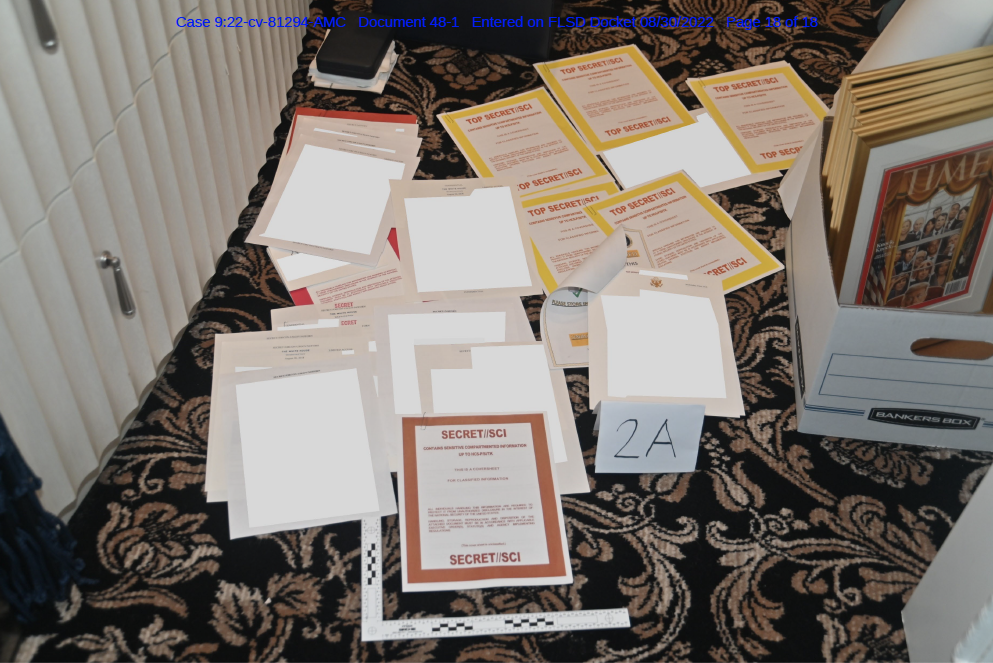Why does the DOJ use so much passive voice in its Mar-a-Lago filing?

The U.S. Department of Justice filed a response to a recent Donald Trump request regarding the raid of Mar-a-Lago. Its filing is full of passive voice, a means of expression I’ve continually railed against. Why is it passive, and should the DOJ be writing in the active voice instead?
Here’s a passage from the DOJ’s filing (passive voice indicated in bold italic):
Through further investigation, the FBI uncovered multiple sources of evidence indicating that the response to the May 11 grand jury subpoena was incomplete and that classified documents remained at the Premises, notwithstanding the sworn certification made to the government on June 3. In particular, the government developed evidence that a search limited to the Storage Room would not have uncovered all the classified documents at the Premises. The government also developed evidence that government records were likely concealed and removed from the Storage Room and that efforts were likely taken to obstruct the government’s investigation. See also MJ Docket D.E. 80 at 8 (“As the Government aptly noted at the hearing, these concerns are not hypothetical in this case. One of the statutes for which I found probable cause was 18 U.S.C. § 1519, which prohibits obstructing an investigation.”). This included evidence indicating that boxes formerly in the Storage Room were not returned prior to counsel’s review.
The DOJ writes about the FBI in active voice, but not the former President
Note the contrast in writing depending on who is doing what.
The DOJ writes about its own actions and the actions of the FBI in active voice:
- “The FBI uncovered multiple sources of evidence indicating that the response to the May 11 grand jury subpoena was incomplete”
- “The government developed evidence that a search limited to the Storage Room would not have uncovered all the classified documents at the Premises”
But statements about what happened out of their vision at Mar-a-Lago are in passive voice:
- “Government records were likely concealed and removed from the Storage Room”
- “Efforts were likely taken to obstruct the government’s investigation“
- “Boxes formerly in the Storage Room were not returned prior to counsel’s review”
(You can verify that these are in passive voice using the “zombies test.” “Efforts were likely taken by zombies to obstruct the government’s investigation” makes perfect sense grammatically, which means that sentence is in passive voice.)
The government’s statements about itself are in active voice because the writer knows who did what. The government lawyers want to give the FBI credit for uncovering and developing evidence.
As for the passive voice sentences, they all refer to activities that happened when the government was not present — so the writer does not know who did them. Active voice rewrites would look like this:
- Someone likely concealed and removed government records from the Storage Room
- Someone likely took efforts to obstruct the government’s investigation
- No one returned the boxes formerly in the Storage Room prior to counsel’s review
The repetition of “someone did this, someone did that” in active voice sentences would emphasize the unknown nature of the actor, while what’s important here is what took place regardless of who actually did it. The passive voice sentences emphasize the action, not the actor.
This is similar to the common use of passive voice in phrases like “My car was stolen.” Obviously, you don’t know who stole it. But the focus is on the theft, not the thief. Pointing out that some unknown person stole the car adds no useful information.
The DOJ’s point here is that Donald Trump, his lawyers, and his other staff at his resort are not complying with requests to return government documents that belong to the government, not the former president. The message is, “He took stuff, his lawyers said he’d returned all of it, and in fact, he and his staff had not only kept the stuff but moved it around to make it harder to find.”
The passive voice exception
When you don’t know who did something, you can’t reasonably find out, and the actor is irrelevant in any case, passive voice is the most economical way to write about it. It’s also helpful when you want to emphasize the actor more than the action.
It still draws attention to itself, like the action of zombies. But the repetition of “someone” and “no one” would be even worse.
My advice in these cases is to think hard about who is doing these things and reveal it when you figure it out. And as it turns out, that’s exactly what the FBI is doing right now.
I suspect the DOJ may have a pretty good idea who “concealed and removed”, “took efforts to obstruct”, and didn’t return the boxes. I think they used passive voice because it’s not in the interest of their efforts to reveal those names at this time.